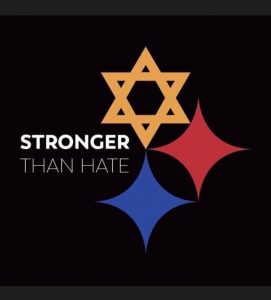 We’ve been living in Pittsburgh for just over seven years, but I’m still quick to tell people I’m a transplant, in case they can’t tell by my New York mannerisms and accent. I often wonder if I truly feel like an outsider, or feed into my own shtick for the sake of not cheating on my own hometown. But where is my hometown? I was born in Israel to an American mother and Israeli father who partially raised us in South Africa, before relocating to New York. Before I had a chance to become too comfortable there, they moved to Texas, where I spent a significant amount of time over a ten-year period. They have since moved to Tennessee, while my own little family has relocated from New York City to Long Island and then New Jersey, before settling in Pittsburgh for what I thought was a temporary stint.
We’ve been living in Pittsburgh for just over seven years, but I’m still quick to tell people I’m a transplant, in case they can’t tell by my New York mannerisms and accent. I often wonder if I truly feel like an outsider, or feed into my own shtick for the sake of not cheating on my own hometown. But where is my hometown? I was born in Israel to an American mother and Israeli father who partially raised us in South Africa, before relocating to New York. Before I had a chance to become too comfortable there, they moved to Texas, where I spent a significant amount of time over a ten-year period. They have since moved to Tennessee, while my own little family has relocated from New York City to Long Island and then New Jersey, before settling in Pittsburgh for what I thought was a temporary stint.
When we moved to Pittsburgh seven years ago, the city’s vibrant Jewish community served as a huge and reassuring draw. Although we settled in the suburbs north of the city and joined a local temple, many of our family’s activities center around Pittsburgh’s Jewish hub: Squirrel Hill.
As an outsider, it seems that most of the people we know are born, bred and part of a multigenerational family that never left this town. So as much as this is the friendliest and kindest place I’ve ever lived in, it’s easy to sometimes feel different. I still struggle to navigate the city, which is not organized like the NYC grid I’m accustomed to and making a left “where the gas station used to be,” is not particularly instructive, when I’ve already been around the same block three times. As a non-sports fan in this sports-crazed town, I often just shut my mouth and nod, because I don’t know the name of every single player, and truth be told, don’t own a single team jersey. And sometimes, I just retreat into missing home, not because I want to live there again, but because it’s safe and familiar.
Everything changed this weekend.
When the news broke on Shabbat morning that a gunman was inside Tree of Life, I was overcome by shock and fear. Scenes of heavily armed law enforcement personnel running towards the synagogue on such familiar streets seemed surreal. As information trickled in about each additional life lost, the reality of the full magnitude of hate and its aftermath sank in.
This was personal.
This was an attack against the Jewish community – my community, myfaith. But my friends and neighbors of all faiths made it clear that they stand with us. On this Shabbat morning I became a full-fledged Pittburgher and I’m proud to be part of a city with a soul like no other. The love and support were palpable on Sunday at the Soldiers and Sailors memorial service. Clergy of all faiths crowded the stage offering comforting and sincere words of hope. The outpouring of messages of love from so many people in my near and far circles kept me going in those initial hours of utter disbelief and immeasurable pain. A simple text – even from people I barely know – made me feel supported and hopeful that love will triumph over evil. We have no choice.
In the darkest hours of this unspeakable tragedy, as we pray for the families and friends of the victims, and mourn the loss to our community, we are heartened and strengthened by the unconditional outpouring of love from our non-Jewish friends and neighbors in this amazing city. Thank you from the bottom of my heart, for letting us know that you stand with us against hate and that with us, you will not tolerate this in our city.
In 1934, Martin Niemoller wrote the following, which is often quoted to explain why communities should care about “others:”
First they came for the socialists, and I did not speak out – because I was not a socialist.
Then they came for the trade unionists, and I did not speak out – because I was not a trade unionist.
Then they came for the Jews, and I did not speak out – because I was not a Jew.
Then they came for me – and there was no one left to speak for me.
Thank you, my fellow Pittsburghers, for loving us, for showing us, for caring and for promising that with us, you won’t stand for hate in Pittsburgh.
I am proud to be part of your city – our city.
I am Pittsburgh.
